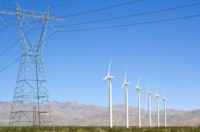The government ramped up its focus on U.S. independence in the supply of critical minerals for electric vehicle and clean energy battery production—as a Senate committee hearing on March 31 revealed an acute need to address domestic supply vulnerabilities and President Joe Biden authorized use of the Defense Production Act to expand sources of materials such as lithium, nickel and cobalt.
The act allows the president to respond to a national emergency by requiring private companies to prioritize orders from the federal government. It's intended to reduce mineral imports from Russia, China and other “unreliable foreign sources” in furthering the U.S. clean energy transition, according to a White House fact sheet.
The act would help companies gain government funding for feasibility studies on projects to develop new mineral sources. It would also help firms upgrade and expand facilities to “secure the supply of such materials through environmentally responsible domestic mining and processing; recycling and reuse; and recovery from unconventional and secondary sources, such as mine waste,” the White House said.
The Biden announcement was part of a broad group of actions to reduce energy prices, including the largest release from the strategic petroleum reserve since its creation in 1977.
Lithium-ion battery supply cannot keep up with demand in 2022, partly due to rising raw material prices, Jiayue Zheng, a consultant at economic research firm Wood-McKenzie, told S&P Global. “Prices for battery metals were already climbing in 2022 before Russia's invasion of Ukraine, pressured by pandemic-induced supply chain constraints, surges in demand and a deficit of new mining projects,” he said, adding that global sales of plug-in passenger EVs—which S&P Global already said would triple this year from 2020 levels—could further accelerate with rising oil and gas prices.
“Without presidential action, U.S. industry cannot reasonably be expected to provide the capability for these needed industrial resources, materials or critical technology items in a timely manner,” Biden said.
‘At a Crossroads’
The president’s announcement followed a Senate Energy and Natural Resources Committee hearing on domestic critical mineral supply chain vulnerability, also on March 31. “We’re at a crossroads now,” said Chairman Joe Manchin (D.W. Va). Senators and the four-person expert panel also focused on the need to integrate “radical improvements” in technology into traditional mining and manufacturing processes.
The U.S. relies on foreign sources for many raw and processed mineral materials, Steven Fortier, director of the U.S. Geological Survey's National Minerals Information Center, told the committee. In 2021, the nation was 100% import-reliant for 17 mineral commodities and at least 50% import-reliant for 30 others, he said.
One panel witness voiced concern over the unpredictable regulatory climate for U.S. projects. Julie Padilla, chief regulatory officer of mining firm Twin Metals Minnesota said that NEPA review for mine and processing plant development is “now based on politics rather than science.”
She said the company recently laid off one-third of its contractor workforce due to regulatory issues for a planned $1.7-billion underground mine near Ely in Northeast Minnesota. It contains the largest known undeveloped copper-nickel deposit in the world, according to Padilla. The region contains 95% of known U.S. nickel resources, 88% of its cobalt, 75% of its platinum group metals and about one-third of copper supply.
But after 10 years and $550 million in exploration and mine design, she said, the Twin Metals Minnesota project could be at risk, with a proposed U.S. Forest Service decision earlier this year to withdraw hundreds of thousands of acres of federal lands from mining development, which could result in a 20-year mining ban in the area. Twin Metals is owned by Chile-based Antofagasta plc, one of the top ten global copper producers.
Minnesota Mine Pros and Cons
The project is opposed by environmental advocates, with a Forest Service official noting at a January hearing “unanswered questions” about potential impacts to a state wilderness area, including contamination from acid mine drainage. An Obama administration moratorium on the project was reversed by the Trump administration in 2019. But project supporters, including a carpenters’ union local, said the mine's environmental review and permitting process should still proceed.
“I don’t think it’s a good idea to arbitrarily preempt the ability for people to design a project, to design a safe and modern approach to utilizing those minerals, because of a presumption of harm,” Doug Connell, a vice president at Barr Engineering, testified at the hearing, according to a Minnesota Public Radio report.
“It’s a challenge for every project,” said Padilla, noting that the average time to permit a new mine in the U.S. is up to 16 years, while in Canada, which also has strong environmental standards, the time frame is two to three years.
“This is an engineering problem. It’s a solvable problem,” said committee member Sen. Angus King, a Maine-based independent, noting that streamlined permitting does not mean lowering standards. “We need to produce more and protect our resources.”
The mining and processing of domestic resources must focus on the entire supply chain, said Sen. Ron Wyden, D-Ore., who in early March introduced the American Energy Development and Growth Enhancement Act to expand critical minerals mining, processing and manufacturing. “It is past time for the United States to become a competitive producer of critical minerals and wean itself off of both foreign oil and gas imports,” he said.
‘NO RUSSIA’ Act Introduced
While uranium was recently dropped as a critical mineral, the Russian incursion has refocused debate on whether it should return to the list, with imports from Russia, Kazakhstan and Uzbekistan now comprising nearly half of the U.S. supply used as nuclear fuel. But there is equal concern over environmental risks of expanded uranium production in the U.S.
Wyoming’s senators, including committee member John Barrasso, seek to expedite formation of a national uranium reserve. He and fellow state Republican Cynthia Loomis, and two others, introduced on March 31 the National Opportunity to Restore Uranium Supply Services In America, or NO RUSSIA, Act. It would require the U.S. Energy Dept. to “immediately begin executing” development of the reserve—giving the agency $15 billion over a decade to do so—and to begin forming a domestic uranium supply chain. “We cannot be reliant on our adversaries for fuel we have here at home,” Barrasso said.
Last year’s federal spending bill included $75 million for DOE to establish the reserve, which would contain only U.S. uranium.
Scott Melbye, executive vice president of Uranium Energy Corp. the largest U.S. uranium exploration, mining, and processing company, and president of the Uranium Producers of America, told the Senate committee that almost no uranium is being domestically produced. He called for revitalization of U.S. mining and enrichment processing.
Because of the Ukraine War, Kazakhstan has had its production and export disrupted, impacting the global market and spiking commodity prices, according to a March 31 Seeking Alpha report. “The federal government is eager to cultivate [U.S.] uranium production to insulate existing and future nuclear power plants from global events that could restrict supply,” it said.
Uranium Energy Corp. is rapidly building up its production capacity, said Seeking Alpha, investing “significantly” to develop four new facilities—one in Arizona, one in Colorado and two in Paraguay. “Once operational, [the firm] will have one of the largest uranium production capacities in the world,” said the market report.
DOE also must move with greater urgency to establish domestic production of HALEU (High-Assay Low-Enriched Uranium) which will power the next generation of advanced nuclear power facilities, Melbye said.
In November 2021, DOE announced a $2-billion commitment to a new HALEU-powered reactor in Wyoming, set to come online in 2028. “More projects will follow and advanced nuclear is going to be key to achieving clean energy goals,” Melbye said, adding that he supports a ban on all uranium imports from Russia, the only current HALEU supplier.
But Shannon Anderson, staff attorney for the Powder River Basin Resource Council, a Wyoming landowners’ group, is concerned about uranium mining expansion impacts on tribal lands and protected environments, she told the Casper, Wyo., Star-Tribune.
Domestic Supply Chain
Manchin noted that critical minerals also “can be produced from waste,” referring to research at West Virginia University that indicates the materials can be extracted from acid mine drainage. That could expedite the domestic supply and processing industry, said Paul F. Ziemkiewicz, managing director of the university’s water research institute.
“While conventional mines might require 5 to 10 years and hundreds of millions of dollars for exploration, permitting and infrastructure development,” acid mine drainage extraction could be initiated almost immediately at operating, already permitted sites, Ziemkiewicz said. A pilot plant would be the next step to test and develop technology.
In a statement, North America’s Building Trades Union President Sean McGarvey said the push will “lead us to a cleaner energy economy while ensuring a strong domestic supply chain.”







Post a comment to this article
Report Abusive Comment